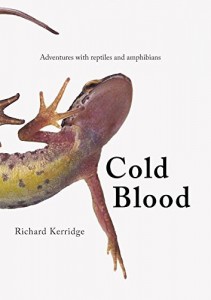
Richard Kerridge’s personal story of life with cold-blooded animals (he wisely doesn’t say ‘poikilothermic’ anywhere) tells how he makes contact with nature for comfort at times of crisis – the first snog with a girlfriend after spotting a Grass Snake, delicately and wittily narrated; or the escapes from his troubled father, who has recurring nightmares of being again in a tank battle in Normandy.
It’s a skilfully told story, with interesting facts about Britain’s native newts, frogs, lizards and snakes, interspersed with personal encounters, mainly from Kerridge’s boyhood, when it was still possible for boys to find, catch and keep these now heavily-protected animals in and around London. It is a shock to realize that Natterjack Toads, now confined to a few wardened sites in the whole of Britain, were a century ago common even in the capital, and everybody knew and seemingly liked their call. Thursley Thrushes, was one of their names: Thursley remaining a fine place for lizards, but sadly too acid for the little toads – did acid rain combine with the natural acidity of the bogs there? All these events are complex and too little known.
I really enjoyed the boyhood adventures, and the boy’s mixed feelings on jumping on a pregnant lizard, only for her to shed her tail, leaving an unhappily bloody stump, a wriggling tail, and disappointment. Kerridge is very good on such moments. I’m less sure I really needed his agonies with his father: not quite convinced there was any organic connection with whatever the wildlife did. Perhaps he was trying a little too hard to make it all into a single story: life can just be untidy. But the fifty-year sweep from the sixties to now, from confused but reptile-rich childhood to mature enjoyment of nature and sober reflection on how much has been lost, is well done. ‘Field herping’ (herpetologising, i.e. finding and photographing reptiles by disturbing them, flipping up stones and the like) is a new term to me: and the fact that it’s illegal in Britain, and pretty much futile given how few species we have, and how rare they have become, triggers another melancholy moment. It’s a matter of everyone’s experience that there is more to see on the continent: that nature in our country is seriously damaged, despite our extraordinary concentration of nature-lovers.
For all that, and the ‘cold blood’ in the title – not exactly a passion-stirring phrase, perhaps – this is a book with plenty of joyful moments, one that gives something of the flavour of what it means to be English and obsessed by nature. As such, it is a book that people who do love nature can read for self-discovery; and people married to nature-lovers can read for explanation.
Buy it from Amazon.com (commission paid)
Buy it from Amazon.co.uk (commission paid)
